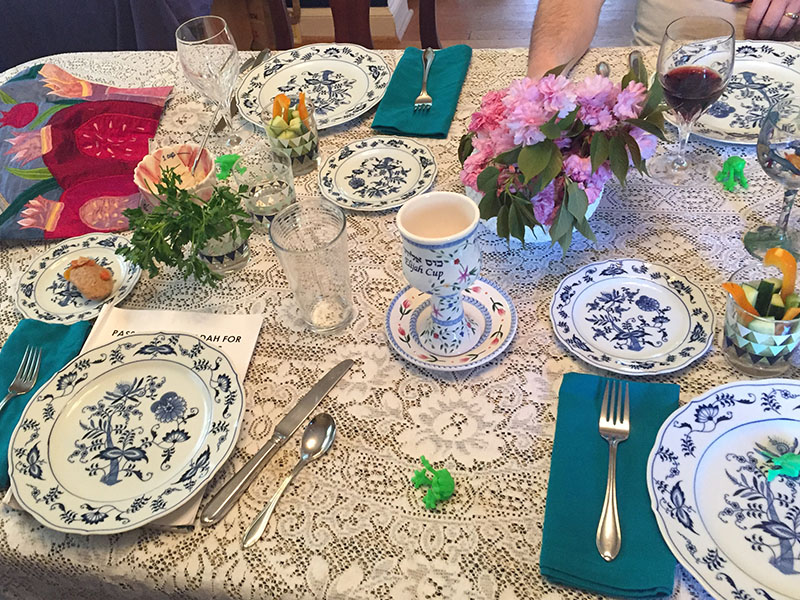In late March, Jewish families will be preparing for our second “pandemic Passover.” One year in, we have moved from asking “How do we create a virtual version of our holiday traditions?” to “What have we learned from 2020?” Now, with several other virtual or reimagined celebrations under our collective belts, it seems we have come full circle.
Passover is a Jewish holiday observed each spring, commemorating when the Israelites were freed from slavery in Egypt and made their way to what is now Israel. It’s ironic when you consider that the original story of Passover tells of 10 plagues which helped facilitate freedom for the Israelites, yet here we are trying to avoid our own plague.
You can use the lessons below – ones I learned from the past year – for your own Passover celebration and/or for future holidays. Details for each of these ideas can be found on The Jewish Federation of Greater Washington’s Passover Resource page.
1: Prepare
In the Biblical book of Exodus, we learn that the Israelites had to leave with such haste, they didn’t have time to let their bread rise (hence the matzah – unleavened bread – eaten during Passover). You have the luxury of knowing Passover is coming (it starts on March 27), so you have some time to prepare.
Hosting a seder (the ritual meal) can be a spur-of-the-moment decision (I know this from experience), but it goes better with some preparation. Give some thought to what will lend meaning to your family’s seder. How much do you want to cook, or do you prefer prepared foods? What recipes do you want to use? Whom do you want to include? How will you gather safely – through Zoom, outdoors or in another way? Which Haggadah (the guidebook to the seder) would you like to use? Make sure you have copies for everyone (digital and/or hard copy). What traditions will make the seder feel right for you?
2: There’s no “Passover Police”
During a pandemic, not even Elijah (the prophet “invited” to every seder) is coming to your door. You can make the Passover experience your own without worrying what others will think. Focus on what’s important to you (see above), and don’t worry about the rest.
3: Make it interactive
The beauty of a seder is that everyone has a guidebook – the Haggadah – to help them follow along. The prayers, explanations and song lyrics are all there for each person to participate. If you are doing a virtual seder, share a link to the Haggadah you’ll be using in advance so that everyone can purchase a copy, print it or pull it up on a screen. Asking questions is a prescribed part of the seder, so encourage additional questions and discussion. Invite guests to help tell the story; you can even make it a skit with parts, costumes and props.
4: Use multimedia
Last year, my children made a movie of the Exodus story using LEGOs, which we shared during our virtual seder. If your seder will be virtual, take advantage of the many technology options out there to share music, stories and songs. Find ideas here: Jconnect.org/pj-library-passover.
5: Send materials in advance
Have family and friends who will join you virtually? Invite them to “share” your meal by sharing the recipes to make at home. You can also drop off some of the food items or safely exchange dishes in advance for a virtual potluck – if they live nearby.
6: Encourage snacking
Offering something to nosh on during the seder – while telling the story and going through the rituals and blessings – can keep the “hanger” at bay, for little ones and grown-ups!
7: Take your time
One benefit of the pandemic is the gift of time – you don’t need to rush. There are versions of the seder that take two minutes, but if we’ve learned anything from this past year, it’s that taking the time to slow down, appreciate the moment and be with family is the best thing we can do. Plan to have the seder take 30-45 minutes before you eat. Incorporating the ideas to make it inclusive and interactive will help everyone be present and enjoy it.
8: Address food insecurity
During the seder, the Haggadah tells us to invite “all who are hungry [to] come and eat.” One way to do this during a pandemic is to use some of the money you are saving on travel or extra food and donate it to address food insecurity, which is a worsening problem in our area. (One organization doing that locally is Nourish Now).
In 2021, Passover begins Saturday, March 27 at sundown and ends the evening of Sunday, April 4. Find resources, Haggadah suggestions, online programs and more on Jconnect.

